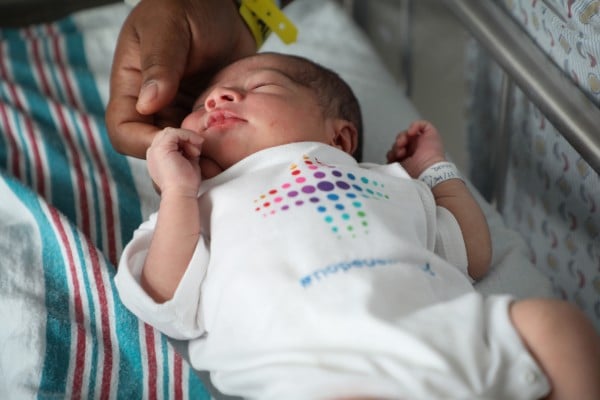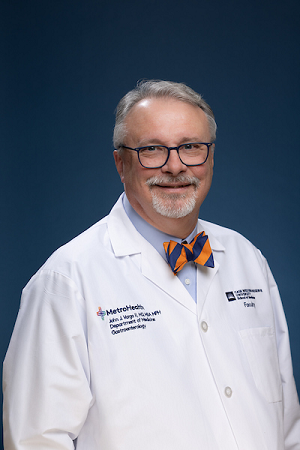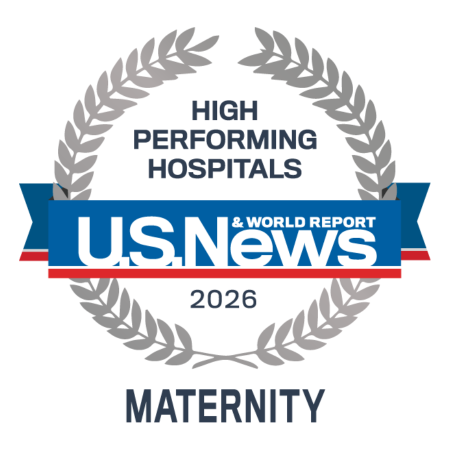MetroHealth Launches Placenta Donation Program
Published on 02/05/2025
 "Birthday gift" has taken on new meaning at the MetroHealth Birthing Center: Patients who deliver babies here have the option of donating their placentas to be used for lifesaving and life-improving therapies for others. MetroHealth is the only hospital system in Northeast Ohio to offer this service.
"Birthday gift" has taken on new meaning at the MetroHealth Birthing Center: Patients who deliver babies here have the option of donating their placentas to be used for lifesaving and life-improving therapies for others. MetroHealth is the only hospital system in Northeast Ohio to offer this service.
The placenta is a temporary organ that forms in the uterus during pregnancy to provide nutrients and oxygen to the fetus as it develops. After the baby is born and the placenta is no longer needed, it is expelled. But it retains regenerative properties that can help heal tissue.
Last fall, the Labor and Delivery department began offering patients the chance to donate their placentas – a process that carries no risk to the patient or newborn – through a partnership with Phoenix Donor Services. Phoenix recovers donated placentas and processes them into therapeutic medical products to help heal burns, injuries from trauma, diabetic ulcers and other wounds. Placental tissue also can be used in applications for plastic surgery, orthopedics, ophthalmology, gynecology and other subspecialties.
Before MetroHealth's placenta donation program, each placenta would be kept for a few days. Then, if it didn't need to be sent to pathology for testing, or the family didn't want to keep it, it became part of the hospital's biological waste. Now, each placenta delivered at MetroHealth has the potential to go on to help other people.
Since the program began at MetroHealth in September, more than 140 patients have donated their placentas, resulting in more than 3,500 grafts.
Kelley Gallagher, MSN, RN, Labor and Delivery Nurse Manager, said patients have embraced the chance to celebrate new life with an act of kindness.
"We've had an enthusiastic response to the placenta donation program," Gallagher said. "Patients are eager to help others, and they seem to appreciate the idea that their babies are making a difference in the world just as they are entering it."
When a placenta is donated, the newborn it nourished for the previous nine months goes home with a teddy bear and a onesie that declares, "I was born a hero."
That neonatal heroism benefits people like the patients of MetroHealth podiatrist Dave Hehemann, DPM. Dr. Hehemann is a champion of the therapy for its effectiveness in the treatment of diabetic ulcers and other wounds.
Plastic Surgeon David Rowe, MD, an expert on wound care, was instrumental in MetroHealth's decision to begin using placental tissue therapy in certain applications five years ago.
"Placental tissue therapy is essential for certain patients," said Dr. Rowe, who joined MetroHealth in 2017 from University Hospitals, where he was Director of Wound Care Centers. "This is one of those products that really makes sense from a physiologic standpoint; it can stimulate patients' tissue to heal their own wounds. In a lot of cases, this truly is a game changer where we're able to help heal wounds that we weren't able to before."
MetroHealth's placenta donation program is coordinated by a nurse from Phoenix, who works in the Birthing Center unit. During the admissions process, MetroHealth Labor and Delivery nurses ask patients if they would like to learn about placenta donation. If they agree, the nurse includes an extra test in the patients' routine lab work from blood that is already being drawn. No additional poke is necessary. This test gauges the health of the placenta to ensure it meets requirements for donation.
The Phoenix nurse then visits the patient to discuss the details. If the patient is eligible and interested, their physician conducts an assessment to ensure they have no health issues that would affect the eligibility of the placenta.
After the patient delivers, the placenta is collected in a designated basin, packaged and stored in Phoenix's refrigerated unit until it is collected and shipped to the organization's processing facility to be converted into wound-healing membranes and other medical products.
"Our nurses work hard to provide our patients with everything they need for the most positive labor and delivery experience possible," said Kimberly Green, MSN, RN, Vice President, Women and Children Services. "Offering the option to donate placentas, and to gain the good feeling that comes from making that meaningful gesture, is another way they contribute to that goal."
Media Contact
Timothy Magaw
Director, System Communications
tmagaw@metrohealth.org
330-606-6241
About The MetroHealth System
Founded in 1837, MetroHealth is leading the way to a healthier you and a healthier community through service, teaching, discovery, and teamwork. Cuyahoga County’s public, safety-net hospital system, MetroHealth meets people where they are, providing care through five hospitals, four emergency departments and more than a dozen health centers. For more information, visit metrohealth.org.





